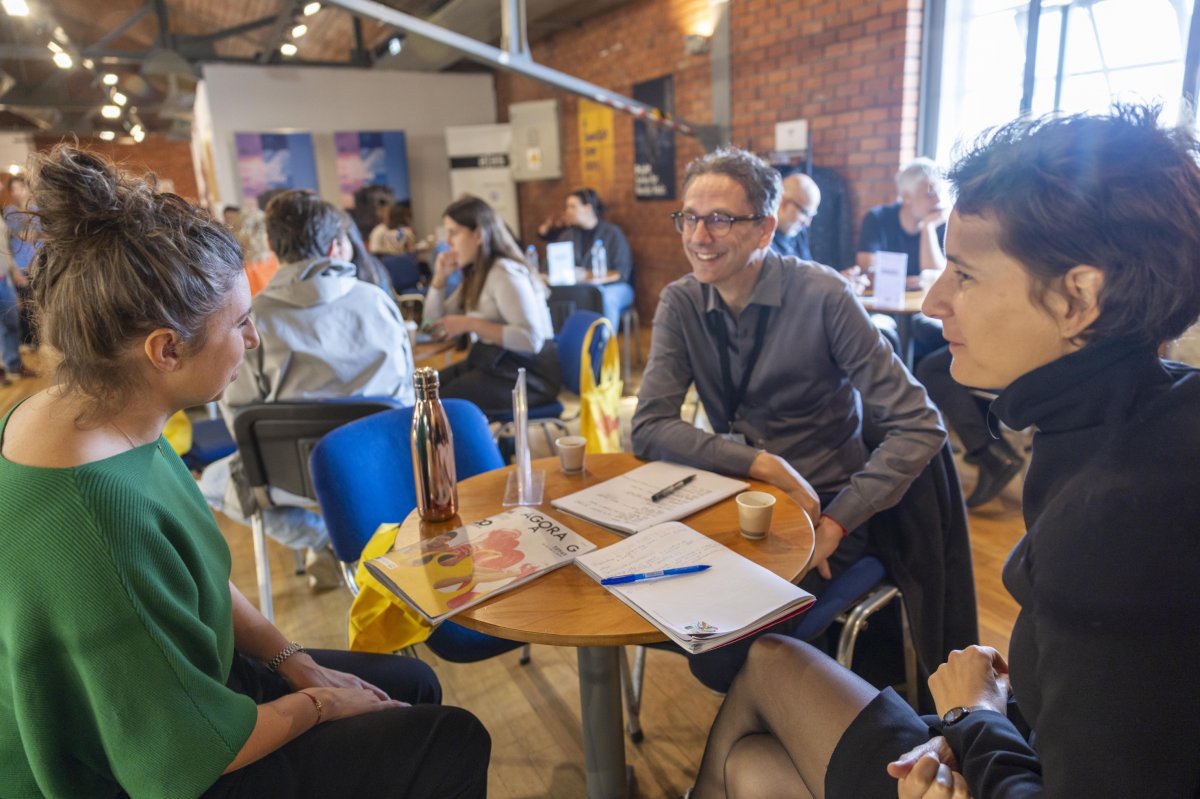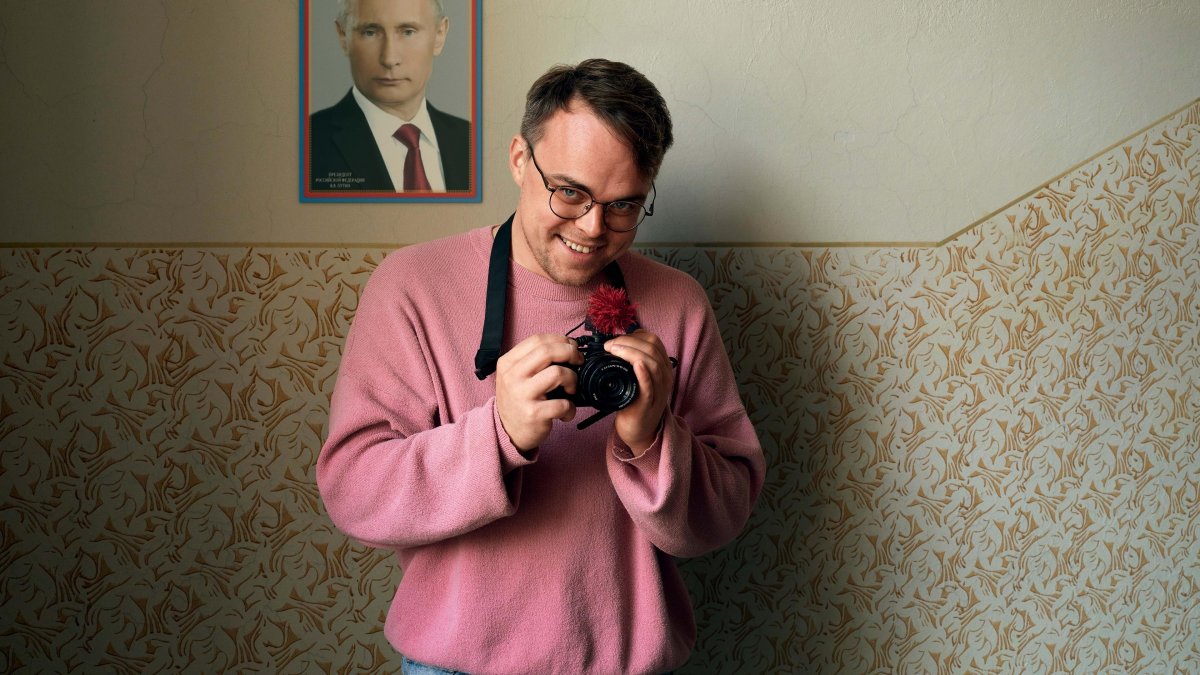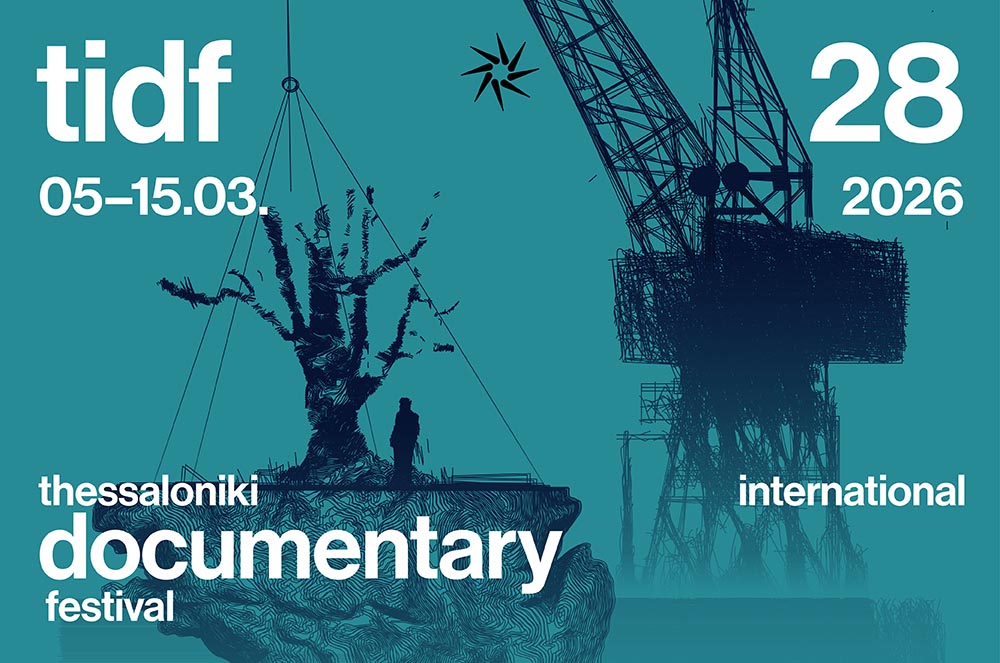Open Talk: EU&Me
How can cinema professionals profit from the tools supplied by the EU and make their work and dream come true? What can the European funding program Creative Europe and the MEDIA program provide to a young artist? A talk on cinema and the creative prospects in a contemporary, European artistic milieu took place on Wednesday, November the 6th, 2019, at the Museum of Photography (Warehouse A, Thessaloniki Docks).
The talkers were: Tina Zournatzi, Head of strategic communication, European Commission, communication department, Helene Skikos, Policy Officer, Creative Europe, Anna Kassimati, the Creative Europe MEDIA program representative in Greece, Vassiliki Diagouma, Director of Communications and International Relations, The National Centre of Audiovisual Media and Communication (EKOME), and Vassilis Kekatos, director.
Mr. Vassilis Kekatos started the conversation by stating that although he is not professionally qualified to talk about such specialized matters, he would elaborate on his personal experience about living and working in the EU framework. Having thanked the panel and the European Commission for having nominated him as EU ambassador, he underlined the fact that he left Greece when he was eighteen years old, to study in England. “That was a very important experience that I carried over into my life and art. The opportunity given is also very important, in order for us to become European citizens, and, as filmmakers, take part in screenplay workshops funded by the European Union. This is where I get to know if my stories are of interest to other people, and if the humor of my films can be transplanted in another language”, as he characteristically put it. Having zealously stressed the importance of international co-productions, and the significance of artistic production bringing people together, he noted that thanks to the EU it is relatively easy for him to go to another country for filming, but also take advantage of the funding programs provided, such as Creative Media Program, and Eurimages. “Belonging to the European Union sounds like belonging to a family; not everything always runs smoothly. But I strongly believe that without the EU things would be much worse”, he added significantly.
Ms. Zournatzi then took the stage, and talked specifically about the European campaign EU&Me. She started by mentioning the fact that this campaign began by acknowledging that a lot of people (and particularly in Greece) are not informed (beyond some very basic stuff, such as the facilitation of mobility) on the advantages for a country to be part of the European Union. Due to a very low percentage of being in favor of the EU (on the order of 50%), a campaign started, having as a target initially the outgoing European elections, in order to address itself to the big majority and more particularly to the young people who do not fully realize what it means to be a European citizen. For this purpose, and for the campaign to reach out to the audience and affect it, the undertaking was channeled through cinema. “What better than cinema that enables us to tell stories, reach out to topics that concern life in the EU, such as mobility, rights, education and sustainability? So, we asked esteemed directors to make a series of short films, up to seven minutes, that would accompany our campaign”, she stated. Having added that the campaign is mostly digital, she then referred the audience to the campaign’s website where one can watch trailers for the aforementioned films, genuine video testimonies, telling stories of people whose life changed in the EU, collaborations with influencers for promoting campaigns, social media presence and collaboration with various youth media. “Our goal is to bring more and more people to us and it is a fact that our campaign has reached out to millions of young people. In what concerns the short films that will be screened also in the Thessaloniki International Film Festival, we had the honor of collaborating with the Greek director Yorgos Zois, who shot the film Party Animal, a great film. We have also participated in other festivals, like AnimaSyros and the Drama Short Film Festival; cinema is our main channel, and through it we try to reach out to the world”, she concluded.
The stage was then given to Ms. Helene Skikos who expanded on the advantages of the Creative Europe program, a program whose goal is to support creativity and culture in Europe and act as relief for the evolution of a solid European cultural identity. The seven-year program, which started in 2013, now reaches its completion, and in 2020 the new program, with significant additions, will be announced. Ms. Skikos referred to the two basic sections of the program, with the MEDIA program being the first (which will be presently elaborated), and the second section concerning every kind of artistic expression that does not include audiovisual media. “Our aim is to intensify communication and collaboration among the member-countries of the program, but also to actively support networks such as film festivals; bring people together, in and out of Europe. At this moment, forty-one countries are members of the program, but we are also collaborating with other, non-member, countries. We also undertake projects related to translating literary works, and we are very proud for having actively worked together with this year’s Nobel laureate, Olga Tokarczuk. We are also in the position to be guarantors for bank loans, so that artists will be able to obtain them more easily. Moreover, we provide music awards, and we award European Capitals of Culture every year. In 2020, it is Novi Sad’s turn, but also Eleusis’ in Greece”, she underlined.
Referring to a new activity in the program, Ms. Skikos talked about “The artists’ Erasmus”, as she herself named it. She referred to the i-Portunus program, a mobility program applied this year for the first time, that provides the opportunity for artists and creators to visit another European country and there continue their project. What they have to do initially is visit the corresponding website for the program, inscribe themselves and fill in an application that concerns the choice of country, the goals they have set for themselves, but also the result they have envisioned. “What we want is to create a specifically-targeted mobility. The visit to the country may vary from fifteen to eighty-five days, and we do not demand any proof on how and where each participant is going to spend the money. Last year, 620,000 euros were distributed to 343 artists selected by the program, mostly women. We received more than 40,000 applications that concerned visual and audiovisual arts. Fifteen participants were Greek and several (mostly young) of the European participants chose Greece as their destination. The program intends to become more versatile next year, with short duration journeys, up to one week. Our aim is to consolidate the program even more, make it even more successful and a doorway for artists towards their international careers”, Ms. Helene Skikos noted emphatically.
Ms. Kassimati was the next speaker; she talked about the MEDIA program, one of the most significant cultural programs that has supported the audiovisual section and assisted the film industry for twenty-seven years. “We successfully run the 5th phase of the program that ends in 2020 and our aim is to collect 800 million euros. The program is designed in such a way as to support the creative chain in its totality, while the Eurimages program is the one occupied mostly with film production. We support projects that display a distinctly European dimension, and we are funding not only festivals, but everything that contributes to the promotion and the solidification of a more effective audiovisual environment”, she noted. Going into more technical matters, she added that subsidization applies to companies and organizations, not natural persons, and the beneficiaries may pertain to the public or the private sector. The program also allows for collaborations with countries that are not members of the program; everybody interested may have access, through the corresponding website, to all necessary documents for a comprehensive overview of the funding programs. One can also be professionally advised and trained by a specialized crew, and will be assisted in the production and the film’s distribution. Ms. Kassimati also emphasized the fact that the program works supplementarily to governmental funding, since it does not cover financial needs 100%. “What we demand from the projects is that they demonstrate an international character, promote collaboration and rely on innovative business models. Program offices are located in thirty-nine countries, staffed with experts ready to help those interested understand the philosophy behind the program. So, everybody interested can sign up, and I personally urge you not to hesitate for one moment”, Ms. Kassimati incited the audience.
Reaching the conclusion of this quite stimulating talk, it was Ms. Vassiliki Diagouma’s turn to talk about the newly founded institution of The National Centre of Audiovisual Media and Communication (EKOME) that began its trajectory in early 2018, and whose main goal is to contribute to the overall cultural landscape, and also help artists realize their ideas. The three basic pillars for supporting audiovisual production in Greece include Cash Rebate, the digitalization of audiovisual works in order to promote the national audiovisual treasure, and education, with the aspiration to create “intelligent” viewers.
In what concerns the financial dimension of the National Centre of Audiovisual Media and Communication, Ms. Diagouma talked about cash rebate, the program that returns 35% of expenses effected in Greece for productions that fall under every genre (film, television, digital games, or animation). “What the interested party has to do is present a solid financing plan, spend over 100,000 euros for the project, and complete the EU cultural criteria form thoroughly. We provide a fully trained support team that offers its help already in the initial stages of the creative idea’s conception. It is of the utmost significance to note here that the financing programs are supplementary: a project may receive funds by the National Centre of Audiovisual Media and Communication and the MEDIA program at the same time, with funding reaching 100% of the total value”, she said characteristically.
In her concluding remarks Ms. Diagouma made clear that the resources come from Greek citizens that the state chose to distribute to the artists. “We want to witness the realization of the projects; more than seventy projects, with 50% of them being international productions, have been green-lit for funding. We are also very pleased to see that filming takes place allover Greece, opening up new jobs constantly. On our side, we want to improve ourselves by constantly providing the necessary modifications and by participating to all major festivals in the country, actively offering them our assistance”, she added, thus concluding the statements.


















